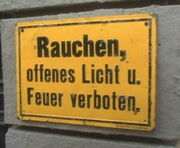No edit summary |
m (Robot: Automated text replacement (-{{[Nn]Cwiki +{{mbeta)) Tag: apiedit |
||
| (16 intermediate revisions by 12 users not shown) | |||
| Line 1: | Line 1: | ||
| − | [[ |
+ | [[File:German sign.jpg|thumb|A sign in the German language stating "[[Smoking]], open light and fire prohibited"]] |
| − | '''German''' was a [[Human language]] spoken on [[Earth]], specifically in the countries of [[Germany]], Austria and [[Switzerland |
+ | '''German''' was a [[Human language]] spoken on [[Earth]], specifically in the countries of [[Germany]], Austria and [[Switzerland]]. |
| − | + | German was the [[language]] spoken by the [[Nazi]] regime of the early [[20th century]], although many were also proficient in [[English language|English]]. ({{VOY|The Killing Game}}; {{ENT|Zero Hour|Storm Front}}) |
|
| − | :''It is probably unlikely that as many Nazis in real life spoke perfect English as they did in episodes of ''[[Star Trek]]''.'' |
||
[[Ensign]] [[Hoshi Sato]] began speaking German while dreaming about her students back on Earth, and again later while attempting to break the lock out code in the [[Decontamination chamber|decon chamber]] in [[2154]], while under the effects of a [[silicon-based virus]]. ({{ENT|Observer Effect}}) |
[[Ensign]] [[Hoshi Sato]] began speaking German while dreaming about her students back on Earth, and again later while attempting to break the lock out code in the [[Decontamination chamber|decon chamber]] in [[2154]], while under the effects of a [[silicon-based virus]]. ({{ENT|Observer Effect}}) |
||
| − | [[ |
+ | [[File:ancientstarchart.jpg|thumb|An ancient star chart in German]] |
| − | + | {{bginfo|An ancient star chart in the German language can be found in the opening credits of ''[[Star Trek: Enterprise]]''.}} |
|
Upon hearing [[Karl Jaeger]]'s German name in [[2267]], [[Trelane]] asked him in German if he were a German soldier and reenacted part of a German marching song. ({{TOS|The Squire of Gothos}}) |
Upon hearing [[Karl Jaeger]]'s German name in [[2267]], [[Trelane]] asked him in German if he were a German soldier and reenacted part of a German marching song. ({{TOS|The Squire of Gothos}}) |
||
| − | ''Wunderkind'' was a German word meaning "wonderchild". [[Doctor]] [[Paul Stubbs]] referred to himself and to [[Wesley Crusher]] as a |
+ | "''Wunderkind''" was a German word meaning "wonderchild". [[Doctor]] [[Paul Stubbs]] referred to himself and to [[Wesley Crusher]] as a ''wunderkind''. Wesley recognized the word as being German. ({{TNG|Evolution}}) |
When a [[holographic]] [[Albert Einstein]] was conversing with [[Reginald Barclay]] after his intellect had been enhanced by the [[Cytherian probe]], Einstein exclaimed ''Grüß Gott'' when Barclay showed him a revolutionary new way to look at the [[Theory of General Relativity]]. ({{TNG|The Nth Degree}}) |
When a [[holographic]] [[Albert Einstein]] was conversing with [[Reginald Barclay]] after his intellect had been enhanced by the [[Cytherian probe]], Einstein exclaimed ''Grüß Gott'' when Barclay showed him a revolutionary new way to look at the [[Theory of General Relativity]]. ({{TNG|The Nth Degree}}) |
||
| − | + | {{bginfo|"''Grüß Gott''" means "(God bless you, literally) Greet God" in English. It is more likely that Einstein meant to say "''Mein Gott''" which is "My God" in English or "''Großer Gott''" which is "Great God", which is an exclamation which Einstein would have, in context, been more likely to have used.}} |
|
| + | |||
| ⚫ | |||
| ⚫ | |||
| + | * {{mbeta}} |
||
| ⚫ | |||
| + | |||
| ⚫ | |||
| ⚫ | |||
| ⚫ | |||
[[de:Deutsch]] |
[[de:Deutsch]] |
||
| + | [[it:Lingua tedesca]] |
||
| + | [[Category:Earth languages]] |
||
Revision as of 05:03, 5 July 2015

A sign in the German language stating "Smoking, open light and fire prohibited"
German was a Human language spoken on Earth, specifically in the countries of Germany, Austria and Switzerland.
German was the language spoken by the Nazi regime of the early 20th century, although many were also proficient in English. (VOY: "The Killing Game"; ENT: "Zero Hour", "Storm Front")
Ensign Hoshi Sato began speaking German while dreaming about her students back on Earth, and again later while attempting to break the lock out code in the decon chamber in 2154, while under the effects of a silicon-based virus. (ENT: "Observer Effect")
An ancient star chart in German
Upon hearing Karl Jaeger's German name in 2267, Trelane asked him in German if he were a German soldier and reenacted part of a German marching song. (TOS: "The Squire of Gothos")
"Wunderkind" was a German word meaning "wonderchild". Doctor Paul Stubbs referred to himself and to Wesley Crusher as a wunderkind. Wesley recognized the word as being German. (TNG: "Evolution")
When a holographic Albert Einstein was conversing with Reginald Barclay after his intellect had been enhanced by the Cytherian probe, Einstein exclaimed Grüß Gott when Barclay showed him a revolutionary new way to look at the Theory of General Relativity. (TNG: "The Nth Degree")
| Earth languages |
|---|
| Arabic • Chinese (Cantonese • Mandarin Chinese) • Dutch • English • Finnish • French • German • Greek • Hawaiian • Hebrew • Hindi • Irish • Italian • Japanese • Latin • Lincos • Norwegian • Polish • Russian • Scots • Sign language (American Sign Language) • Spanish • Swahili • Welsh • Whale song • Wolof |
External links
- German language at Memory Beta, the wiki for licensed Star Trek works
- German language at Wikipedia
